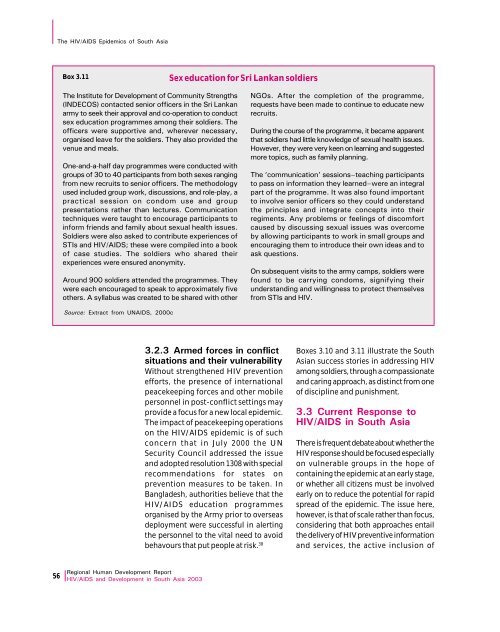Download Report - UNDP Asia-Pacific Regional Centre - United ...
Download Report - UNDP Asia-Pacific Regional Centre - United ...
Download Report - UNDP Asia-Pacific Regional Centre - United ...
Create successful ePaper yourself
Turn your PDF publications into a flip-book with our unique Google optimized e-Paper software.
The HIV/AIDS Epidemics of South <strong>Asia</strong>Box 3.11Sex education for Sri Lankan soldiersThe Institute for Development of Community Strengths(INDECOS) contacted senior officers in the Sri Lankanarmy to seek their approval and co-operation to conductsex education programmes among their soldiers. Theofficers were supportive and, wherever necessary,organised leave for the soldiers. They also provided thevenue and meals.One-and-a-half day programmes were conducted withgroups of 30 to 40 participants from both sexes rangingfrom new recruits to senior officers. The methodologyused included group work, discussions, and role-play, apractical session on condom use and grouppresentations rather than lectures. Communicationtechniques were taught to encourage participants toinform friends and family about sexual health issues.Soldiers were also asked to contribute experiences ofSTIs and HIV/AIDS; these were compiled into a bookof case studies. The soldiers who shared theirexperiences were ensured anonymity.Around 900 soldiers attended the programmes. Theywere each encouraged to speak to approximately fiveothers. A syllabus was created to be shared with otherNGOs. After the completion of the programme,requests have been made to continue to educate newrecruits.During the course of the programme, it became apparentthat soldiers had little knowledge of sexual health issues.However, they were very keen on learning and suggestedmore topics, such as family planning.The ‘communication’ sessions–teaching participantsto pass on information they learned–were an integralpart of the programme. It was also found importantto involve senior officers so they could understandthe principles and integrate concepts into theirregiments. Any problems or feelings of discomfortcaused by discussing sexual issues was overcomeby allowing participants to work in small groups andencouraging them to introduce their own ideas and toask questions.On subsequent visits to the army camps, soldiers werefound to be carrying condoms, signifying theirunderstanding and willingness to protect themselvesfrom STIs and HIV.Source: Extract from UNAIDS, 2000c3.2.3 Armed forces in conflictsituations and their vulnerabilityWithout strengthened HIV preventionefforts, the presence of internationalpeacekeeping forces and other mobilepersonnel in post-conflict settings mayprovide a focus for a new local epidemic.The impact of peacekeeping operationson the HIV/AIDS epidemic is of suchconcern that in July 2000 the UNSecurity Council addressed the issueand adopted resolution 1308 with specialrecommendations for states onprevention measures to be taken. InBangladesh, authorities believe that theHIV/AIDS education programmesorganised by the Army prior to overseasdeployment were successful in alertingthe personnel to the vital need to avoidbehavours that put people at risk. 38Boxes 3.10 and 3.11 illustrate the South<strong>Asia</strong>n success stories in addressing HIVamong soldiers, through a compassionateand caring approach, as distinct from oneof discipline and punishment.3.3 Current Response toHIV/AIDS in South <strong>Asia</strong>There is frequent debate about whether theHIV response should be focused especiallyon vulnerable groups in the hope ofcontaining the epidemic at an early stage,or whether all citizens must be involvedearly on to reduce the potential for rapidspread of the epidemic. The issue here,however, is that of scale rather than focus,considering that both approaches entailthe delivery of HIV preventive informationand services, the active inclusion of56<strong>Regional</strong> Human Development <strong>Report</strong>HIV/AIDS and Development in South <strong>Asia</strong> 2003
















